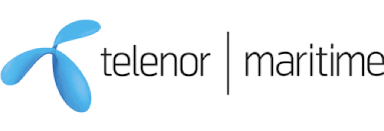While today’s cruise guests can enjoy mobile phone and Wi-Fi services at sea, the speed and reliability of such networks often leaves much to be desired. Getting it right provides cruise companies with many additional benefits – not least, the ability to communicate directly with guests. Jan Erik Norli, chief sales officer at Telenor Maritime, tells us more.
Cruises might still represent the ultimate getaway but, in the era of the connected traveller, being cut off from an ever-expanding digital world is a far less attractive prospect than it once was. Guests want to send pictures to friends back home within seconds of taking them, make video calls with family and read up on their next port of call, all while streaming music and films.
“It’s interesting to think that the mobile phone has been part of our daily lives since the early 1990s yet it has only been possible to use one on board vessels since 2003, when the first tests were conducted – and, until 2013, mainly only for voice and SMS,” comments Jan Erik Norli, chief sales officer at Telenor Maritime. “In the meantime, the mobile device has evolved to become central to everything we do.”
The smart solution
With the wide availability of terrestrial fast data services placing smartphones at the centre of social interactions, cruise companies have much to gain from enabling this to continue smoothly on board. As well as meeting guest expectations, an intelligent digital strategy will improve customer experience and lead to increased revenues.
Telenor’s Smart Ship solution, launched in 2015, enables cruise companies to offer passengers additional information such as wayfinding and personalised offers, via a branded app, while also collecting helpful data for analytics on guest preferences and activities.
Achieving the speed and consistency of data services necessary for this requires a depth of knowledge that extends to not only the different technologies used to obtain coverage at sea, but also how they interact with the end-user device.
“It’s a case of providing not just a proper network on board, but also the connectivity layer to the vessel, combining a VSAT from our own source with 4G mobile broadband and the application layer on the ship,” Norli explains.
Smooth sailing
The ability to design such a network, which has already seen the company bring 4G to the waves, is part of a long history of technical knowledge within Telenor Group. This expertise allows Telenor Maritime to identify potential problems that others may miss, Norli reveals.
“Before we launched our first Smart Ship solution, two years ago, there wasn’t a clear understanding of the interplay between mobile and Wi-Fi on a ship. But what we know, as a mobile operator, is that a ‘pervasive’ network – enabling service to all corners of the ship – allows guests to enjoy a smooth experience throughout a carefully designed connectivity layer.
5G future
Telenor’s know-how in this area becomes particularly significant in the run up to the rollout of 5G, which will further influence the way mobile and other devices impact our lives. With the technology anticipated as early as 2020, Norli believes Telenor Maritime could deliver 5G on a cruise ship within five years, but the reality of this is more a question of digital strategy in the sector.
“Cruise brands are often masters of reading trends but, when it comes to the mobile experience, it takes some time to understand the mobile ecosystem,” Norli says. “My advice would be to contact the players that understand the principles of quality of end-user experience – telecoms companies like ours – and have the expertise to apply it on board your vessels. Our latest contract with Silversea demonstrates this with its unprecedented new backhaul and connectivity platform, enabling, for example, streaming services for all passengers all around the globe.”
He advises cruise companies to think ahead so that 4G and 5G-ready networks can be built into a ship’s design pipeline in advance – and to look for inspiration in the wave of innovations within the wider maritime industry. Already, Telenor is working with big players within research, engineering, and oil and gas to conduct remote-controlled operations at sea through on-board 4G networks.
While autonomous cruise ships might be a step too far, the potential for the internet of things and general connectivity within cruise ship service and entertainment is huge – not least, Norli feels, in bringing the personalised service found in the luxury cruise sector to a wider market. Mobile technology is a means for cruise lines to achieve this, and Telenor is expecting the call.


